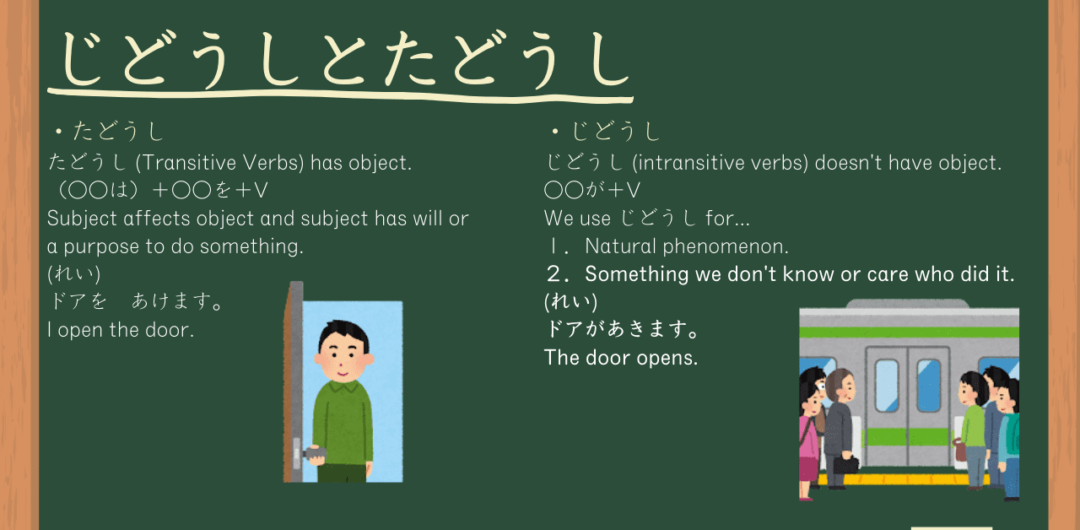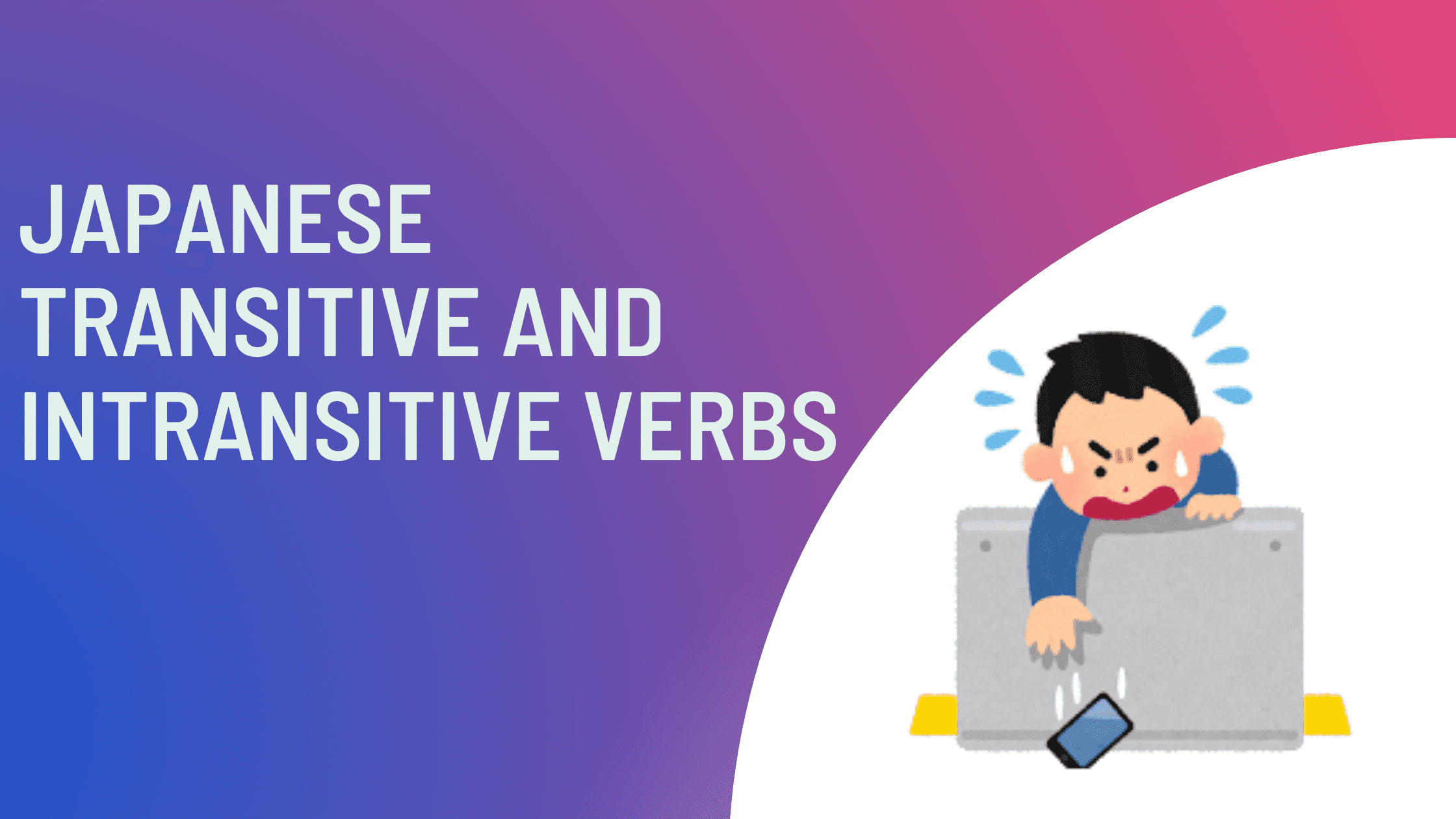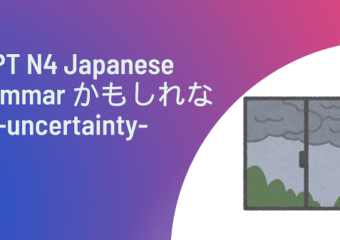Do you know the difference between 「ドアがあく」and「ドアをあける」?
あける is たどうし(Transitive verb) and あく is じどうし(Intransitive verb), but you may not know the words, even English.
Therefore, I explain the difference of these two verbs.
When you finish reading this article, you will be able to use these verbs more naturally.
*Are you looking for a place to practice Japanese?
Youtonihongo is for you.
You may receive one free 30-minute trial lesson.

The free trial class online
We offer online classes and in person classes
たどうしとじどうし
Let’s think about English grammar.
If someone said “I ate”, what would you response?
Probably, you would say “ate what?”, right?
We have to put object after “eat”.
Like the verbs are たどうし (Transitive verbs).
In contrast, we don’t have to put object after “go” and “come” and so on.
These verbs are じどうし (Intransitive verbs).
In Japanese grammar, we put ○○を before たどうし (Transitive verbs).
For example,
ごはんを たべます。
ジュースを のみます。
てがみを かきます。
On the other hand, there is no object in じどうし (Intransitive verbs).
For instance,
こうえんへ いきます。
6じに おきます。
12じに ねます。
Some verbs are the same form for both たどうし and じどうし.
For example,
かぜがふく and リコーダーをふく.
However, there are verbs which have different form between たどうし and じどうし.
For instance,
ドアをあける and ドアがあく。
まどをわる and まどがわれる。
Let’s think about the way to use these verbs.
たどうし
たどうし (Transitive Verbs) has object.
(○○は)+○○を+V
*We usually omit subject.
(れい)
(わたしは)ごはんをたべます。
Subject affects object and subject has will or a purpose to do something.
For, instance,
English:I opened the door.
In this case, “I” affect the door and “I” also have a purpose.
It was hot or “I” wanted someone to enter. We don’t know the reasons.
Anyway, “I” had a purpose.
(れい)
さとうを コーヒーに いれました。 I put sugar into coffee.
さいふを おとしましたよ。You dropped your wallet.
Like these cases, someone has a purpose or affects object.
じどうし
じどうし (intransitive verbs) doesn’t have object.
○○が+V
Subject for じどうし is usually inanimate object, so subject doesn’t have will or a purpose.
When do we use じどうし?
I will pick two patterns to use じどうし.
1.Natural phenomenon.
English:Buildings fell down by the earthquake.
The earthquake is the natural phenomenon and there is no agent (actor) which affects fall down buildings.
In this case, we use じどうし.
*Agent is a linguistic word. It means the thematic relation of the cause or initiator to an event.
The agent is a semantic concept distinct from the subject of a sentence as well as from the topic.
2.We don’t know or care who did it.
English:The water has boiled
In this case, there may be agent, but we don’t have to know who boiled it and the speaker probably wants to focus on the consequence rather then who boiled it.
Let’s think about one situation.
You had a child and he threw your smartphone and broke it.
Your child told you スマホがこわれました.
You would say こわしたんだよね?
Now, can you explain the difference?
スマホがこわれました means no one touched it, but it broke suddenly.
Probably, it was old.
The child said こわれた for excuse.
On the other hand, こわした means someone affects your smartphone.
In this case, your child affected (threw the phone) your phone and he broke it.
じどうしとたどうしのルール
You need to memorize so many じどうし and たどうし, but I teach you some general rules.
1.The verbs ending aru is always じどうし and when aru changes eru, it becomes たどうし.
しまる (shimaru)→しめる (shimeru)
あがる (agaru)→あげる (ageru)
2.The verbs ending reru is always じどうし.
たおれる (taoreru)、われる(wareru)
3.The verbs ending su is always たどうし.
こわす (kowasu)、たおす(taosu)、おとす (otosu)
じどうしとたどうしリスト
| じどうし | たどうし | English |
| こわれる | こわす | Break (ex. computer) |
| われる | わる | Break (ex. glass) |
| おれる | おる | Break (ex. branch) |
| たおれる | たおす | fall down |
| たつ | たてる | stand/build |
| おちる | おとす | fall/drop |
| はいる | いれる | enter, put into |
| きえる | けす | turn off |
| つく | つける | turn on |
| あく | あける | open |
| しまる | しめる | close |
| あがる | あげる | go up |
| さがる | さげる | go down |
Conclusion

たどうし (Transitive Verbs) has object.
(○○は)+○○を+V
Subject affects object and subject has will or a purpose to do something.
じどうし (intransitive verbs) doesn’t have object.
○○が+V
We use じどうし for something…
1.Natural phenomenon.
2.We don’t know or care who did it.
Exercise
1.まどが(あいています・あけています)。
2.でんきを(きえて・けして)ください。
3.手を(あがる・あげる)。
4.ボールがゴールに(はいりました・いれました)。
5.大きな木が(たおれました・たおしました)。
6.まどが(われました・わりました)。
7.けいたいを(こわれて・こわして)しまいました。
8.でんきを(ついて・つけて)ください。
9.まどが(われました・わりました)。
10.ほねが(おれました・おりました)。
Answer
1.まどが(あいています)。
2.でんきを(けして)ください。
3.手を(あげる)。
4.ボールがゴールに(はいりました)。
5.大きな木が(たおれました)。
6.まどが(われました)。
7.けいたいを(こわして)しまいました。
8.でんきを(つけて)ください。
9.まどが(われました)。
10.ほねが(おれました)。
If you have questions, please comment below.
If you’d like to learn more Japanese, please feel free to contact me.
I teach Japanese in-person or online.
You can also learn Japanese on my Instagram page.

The free trial class online
We offer online classes and in person classes



